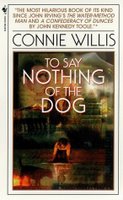A hilarious, enteraining book that is worth re-reading every now and then. I always describe this to people as a time-travel mystery romance Victorian novel-- and that gives some idea of the originality of this book. Even though I've read it before, I still found myself chuckling and laughing out loud. And even though I know the answers to all the various little mysteries, I was still amazed at how very many clues (that I had missed before) there were scattered through the story. Part of Willis' genius is that she can use all the standard mystery clichés and turn them into something completely new. Another part of her brilliance, and the charm of this book, is the narrator's voice, including the effects of time-lag.
In the world Willis creates, time-travel is handled by the historians (in this case, at Oxford). When the corporations discovered they couldn't loot the past (because that would cause incongruities), they lost interest. However, funding is always scarce, so when a money-making proposition comes along, they take it-- little knowing the demands that will be made by Lady Schrapnell and her project to rebuild Coventy Cathedral (in Oxford), including tracking down such oddities as the Bishop's Bird Stump.
The book is narrated by Ned Henry, and at the beginning of the book he is severly time-lagged because he's been working hard doing time-travel research for Lady Schrapnell (and the deadline for the cathedral is coming quickly). According to Ned, "one of the first symptoms of time-lag is a tendency to maudlin sentimentality, like an Irishman in his cups or a Victorian poet cold-sober." Every now and then Ned will start rhapsodizing about something, and then he (or someone else) will catch himself. Having a future time-traveller experiencing the Victorian age also gives the opportunity for lots of wry commentary-- for instance, Ned's explanation that the repression in Victorian society was due to the enormous over-abundance of furniture and the great care that was required to move among it all. Every now and then Ned will mistakenly refer to something that hasn't happened yet (usually under his breath), like the Titanic, and then looks around and hopes no one was paying attention.
The other brilliant thing about this book is the portrayal of time as a chaotic system. Willis is able to give a very understandable sense of this, partly through the ongoing argument between two eccentric Oxford dons and their view of history-- whether it is shaped by individuals or natural forces (of course, chaos theory includes both). Ned and his fellow time-traveller Verity are trying to steer history to the correct course (as they know it), and don't know how much or how little effect something like a cat, or a dog might make in the grand scheme of things. Towards the end Willis gives one dizzying glimpse of the significance of the actions that take place in this story and their part in the larger chaotic system of the time continuum, but then the characters almost immediately discount it as a sketchy theory, leaving the reader to wonder.
| Title: | To Say Nothing of the Dog, or How We Found the Bishop's Bird Stump at Last |
|---|---|
| Author: | Connie Willis |
| Date published: | 1998 |
| Genre: | Science Fiction |
| Number of pages: | 493 |
| Notes: | repeat reading |



0 comments:
Post a Comment